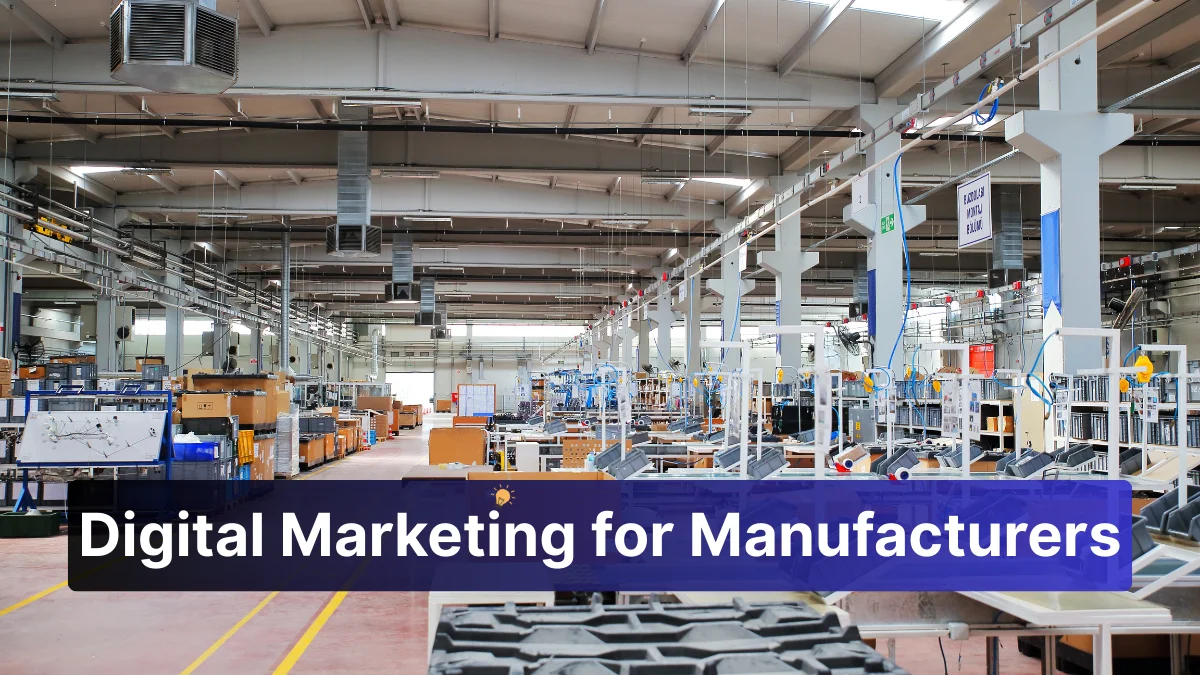Imagine you're running a successful manufacturing business. Your products are top-notch, your team is skilled, and your clients are happy. But there's one problem – you're not getting enough new customers. Sound familiar?
Here's the thing: even the best manufacturers can struggle to grow if potential customers can't find them online. That's where digital marketing comes in.
Don't worry if the word "digital" makes you break out in a cold sweat. We're going to walk through everything you need to know about digital marketing for manufacturers in plain English. No confusing tech talk, no overwhelming strategies – just practical advice you can actually use.
By the end of this guide, you'll understand what digital marketing is, why it matters for your business, and how to get started without breaking the bank or hiring a team of experts.
What Is Digital Marketing and Why Does It Matter for Manufacturers?

Breaking Down Digital Marketing
Think of digital marketing like traditional marketing's tech-savvy cousin. Instead of placing ads in newspapers or sending direct mail, you're reaching customers through websites, social media, email, and search engines.
Digital marketing includes activities like:
-
Having a professional website that shows up when people search for your products
-
Sharing helpful content on social media platforms
-
Sending newsletters to your customers via email
-
Creating blog posts that answer common questions about your industry
Why Manufacturers Need Digital Marketing Now More Than Ever
You might be thinking, "My business has survived just fine with word-of-mouth referrals and trade shows. Why fix what isn't broken?"
Here's the reality: your customers' buying habits have changed dramatically. Even in B2B manufacturing, 67% of the buyer's journey happens online before they ever talk to a salesperson. This means potential customers are researching suppliers, comparing options, and making decisions long before they pick up the phone.
Consider this scenario: A procurement manager needs a new supplier for industrial components. What's their first move? They don't flip through the Yellow Pages (does anyone even have those anymore?). They fire up Google and start searching.
If your business doesn't show up in those search results, you might as well be invisible.
The Manufacturing Industry's Digital Wake-Up Call
The manufacturing sector has traditionally been slower to adopt digital marketing compared to other industries. Many manufacturers have relied on relationships, referrals, and trade publications for decades.
But the pandemic accelerated digital adoption across all industries. Trade shows were cancelled, in-person meetings became video calls, and buyers had to find new ways to discover and vet suppliers online.
Smart manufacturers recognized this shift and started investing in digital marketing. The ones who didn't? They're playing catch-up now.
Key Digital Marketing Strategies for Manufacturers

Let's dive into the main digital marketing strategies that work best for manufacturing businesses. Don't feel like you need to master all of these at once – start with one or two that make the most sense for your business.
Search Engine Optimization (SEO): Getting Found Online
SEO is like making sure your business shows up in the phone book – except the phone book is Google, and everyone uses it.
What SEO means for manufacturers:
When someone searches for "custom metal fabrication in Ohio" or "industrial pump suppliers," you want your business to appear in the search results. SEO helps make that happen.
Simple SEO tactics for manufacturers:
-
Create web pages that describe your specific services and capabilities
-
Write blog posts answering common questions your customers ask
-
Make sure your website loads quickly and works well on mobile devices
-
Get other reputable websites to link to your content
Real-world example:
A small machine shop in Michigan started writing blog posts about common machining problems and solutions. Within six months, they were getting 50% more website visitors and receiving inquiries from companies they'd never worked with before.
Content Marketing: Sharing Your Expertise
Content marketing is about creating helpful information that shows your expertise and builds trust with potential customers.
Content ideas for manufacturers:
-
How-to guides related to your industry
-
Case studies showcasing successful projects
-
Videos showing your manufacturing process
-
Comparisons of different materials or techniques
Think of content marketing as being helpful first and selling second. When you consistently provide valuable information, people start to see you as an expert they can trust.
Example in action:
A plastic injection molding company creates monthly guides about choosing the right materials for different applications. These guides get shared throughout their industry, bringing in qualified leads who already view the company as knowledgeable and trustworthy.
Social Media Marketing: Building Relationships at Scale
Social media for manufacturers isn't about posting selfies or food photos. It's about connecting with your industry community and showcasing your capabilities.
LinkedIn is your best friend:
LinkedIn is where your B2B customers hang out. Share industry insights, celebrate completed projects, and engage with posts from potential customers and partners.
Other platforms worth considering:
-
YouTube: Perfect for showing your manufacturing process or explaining complex concepts
-
Facebook: Good for reaching smaller businesses and building community
-
Instagram: Great if your products are visually interesting or if you want to show behind-the-scenes content
Keep it simple:
You don't need to be on every platform. Pick one or two where your customers are most active and focus on doing those well.
Email Marketing: Staying Top of Mind
Email marketing is like having a direct line to your customers' inboxes. It's one of the most cost-effective ways to stay connected with existing customers and nurture potential ones.
Email marketing for manufacturers:
-
Monthly newsletters with industry updates and company news
-
Educational email series for new subscribers
-
Follow-up sequences for quote requests
-
Announcements about new capabilities or certifications
The key to successful email marketing:
Make it valuable. Nobody wants to read a sales pitch every week. Share useful information, industry insights, and updates that your customers actually care about.
Pay-Per-Click (PPC) Advertising: Quick Visibility
PPC advertising is like renting a billboard on the internet highway. You pay when someone clicks on your ad, and you can start getting visibility immediately.
When PPC makes sense for manufacturers:
-
You're launching a new service and want quick visibility
-
You're competing for high-value keywords
-
You want to test messaging before investing in long-term SEO
PPC tips for beginners:
-
Start with a small budget and test different ads
-
Target specific, relevant keywords (not broad terms like "manufacturing")
-
Send people to dedicated landing pages, not your homepage
Benefits of Digital Marketing for Manufacturers

Now that we've covered the main strategies, let's talk about why digital marketing is worth your time and investment.
Cost-Effective Customer Acquisition
Traditional manufacturing marketing often relied on expensive trade shows, print advertisements, and cold calling. Digital marketing offers a much more cost-effective approach.
Consider the numbers: A trade show booth might cost $15,000-50,000 for a few days of exposure to a limited audience. That same budget invested in digital marketing could generate leads continuously for months or even years.
Better Targeting and Measurement
With digital marketing, you can target exactly the right people and measure your results precisely.
Want to reach procurement managers at companies with 500-1000 employees in the automotive industry? You can do that with LinkedIn advertising. Want to know exactly which marketing activities are bringing in the most qualified leads? Digital marketing tools make that easy to track.
24/7 Marketing That Never Takes a Day Off
Your website, content, and online presence work for you around the clock. While you're sleeping, potential customers in different time zones might be discovering your business and learning about your capabilities.
Building Credibility and Trust
A professional online presence builds credibility. When potential customers research your company online, what do they find? A well-designed website with helpful content and active social media presence suggests a modern, professional business.
Leveling the Playing Field
Digital marketing allows smaller manufacturers to compete with larger companies. A well-executed content marketing strategy can help a small shop gain more visibility than a large competitor who isn't investing in digital marketing.
Long-Term Asset Building
Unlike traditional advertising that stops working when you stop paying, digital marketing builds long-term assets. Blog posts continue to attract visitors for years. SEO improvements compound over time. Your email list becomes more valuable as it grows.
Common Challenges and How to Overcome Them

Let's address the elephant in the room – the challenges that stop many manufacturers from embracing digital marketing.
"We Don't Have Time for This"
The challenge: Running a manufacturing business is demanding. Adding digital marketing to your plate feels overwhelming.
The solution: Start small and be consistent. Spending 30 minutes a week writing a short blog post or updating your LinkedIn page is better than doing nothing. As you see results, you can gradually invest more time or hire help.
Practical tip: Block out 30 minutes every Friday afternoon for digital marketing activities. Make it a regular part of your routine, like reviewing production schedules or checking safety reports.
"Our Industry Is Too Technical for Social Media"
The challenge: You think your products are too specialized or technical for digital marketing.
The solution: Remember that other professionals in your industry are online too. Your technical expertise is actually an advantage – you can create content that resonates with other technical people who might become customers or partners.
Example: A company that makes specialized sensors for aerospace applications shares technical insights on LinkedIn. Their posts regularly get engagement from engineers at major aerospace companies.
"Digital Marketing Is Too Expensive"
The challenge: You think digital marketing requires a huge budget.
The solution: Digital marketing can be as affordable as you need it to be. Creating helpful blog posts, optimizing your website for search engines, and posting on LinkedIn can all be done for free.
Budget-friendly approach: Start with free tactics like content creation and organic social media. As you see results and generate more revenue, you can invest in paid advertising or professional help.
"We Don't Know Where to Start"
The challenge: Digital marketing seems complicated and overwhelming.
The solution: Focus on one thing at a time. Don't try to master every strategy simultaneously.
Suggested starting order:
-
Ensure your website clearly explains what you do and how to contact you
-
Start sharing helpful content related to your expertise
-
Optimize your website for search engines
-
Begin collecting email addresses and sending regular newsletters
-
Experiment with paid advertising once you've mastered the basics
"How Do We Measure Success?"
The challenge: Not knowing if your digital marketing efforts are working.
The solution: Define clear, measurable goals from the start.
Manufacturing-specific metrics to track:
-
Website visitors and where they come from
-
Number of quote requests generated online
-
Email subscribers and engagement rates
-
Social media followers and engagement in your industry
-
Most importantly: actual sales that can be traced back to digital marketing efforts
Practical Tips to Get Started with Digital Marketing

Ready to take action? Here's your step-by-step roadmap to getting started with digital marketing.
Step 1: Audit Your Current Online Presence
Before you start creating new marketing materials, take stock of what you already have.
Quick audit checklist:
-
Google your business name – what shows up?
-
Visit your website – is it clear what you do and how people can contact you?
-
Check if your business information is accurate on Google My Business
-
Look at your LinkedIn company page – is it complete and professional?
Step 2: Define Your Ideal Customer
You can't market effectively if you don't know who you're trying to reach.
Create a simple customer profile:
-
What industry are they in?
-
What size company do they work for?
-
What challenges do they face that your products solve?
-
Where do they go for information about your industry?
Step 3: Start with Your Website
Your website is your digital headquarters. Everything else points back to it.
Essential website elements for manufacturers:
-
Clear description of your services and capabilities
-
Contact information prominently displayed
-
Case studies or examples of your work
-
Information about your certifications and quality standards
-
Easy-to-find quote request form
Step 4: Create Your First Piece of Content
Don't overthink this. Start with answering one question you get asked frequently.
Content ideas to get started:
-
"How to choose the right [material/process] for your application"
-
"Common mistakes in [your specialty] and how to avoid them"
-
"What to look for when selecting a [type of supplier you are]"
Step 5: Set Up Basic Analytics
You can't improve what you don't measure. Set up Google Analytics on your website to start tracking visitors and their behavior.
Step 6: Be Consistent
Consistency beats perfection every time. It's better to publish one blog post every month for a year than to publish 12 posts in one month and then nothing for 11 months.
Create a simple content calendar:
-
Week 1: Write a blog post
-
Week 2: Share industry news on LinkedIn with your thoughts
-
Week 3: Send a newsletter to your email list
-
Week 4: Create a case study or project showcase
Step 7: Engage with Your Industry Online
Don't just broadcast – participate in conversations.
Ways to engage:
-
Comment thoughtfully on industry posts on LinkedIn
-
Share and add insight to relevant articles
-
Join industry groups and contribute to discussions
-
Answer questions in online forums related to your expertise
Step 8: Track and Adjust
After a few months, review your analytics and see what's working.
Questions to ask:
-
Which content gets the most engagement?
-
What sources are sending the most qualified visitors to your website?
-
Which digital marketing activities are generating actual leads?
Use these insights to double down on what's working and adjust what isn't.
Getting Help When You Need It
You don't have to do everything yourself. Here's when and how to get help with your digital marketing efforts.
When to Consider Professional Help
Signs it might be time to hire help:
-
You're consistently getting good results but want to scale up
-
You have the budget but not the time to manage everything yourself
-
You need specialized skills (like advanced SEO or paid advertising management)
-
Your current efforts have plateaued and you need fresh expertise
Types of Help Available
Freelancers: Good for specific projects like website redesign or content creation
Agencies: Best when you need comprehensive help across multiple areas
Consultants: Ideal when you want to learn and implement strategies yourself but need expert guidance
Part-time specialists: Consider hiring someone part-time to manage your digital marketing while you focus on running your business
Questions to Ask Potential Partners
-
Do you have experience working with manufacturers?
-
Can you provide case studies from similar businesses?
-
How do you measure success?
-
What's included in your service, and what would be extra?
-
How will we communicate and how often?
Conclusion
Digital marketing for manufacturers doesn't have to be complicated or overwhelming. Like any other business process, it comes down to understanding your goals, implementing the right strategies, and continuously improving based on results.
The manufacturing industry is experiencing a digital transformation whether individual companies participate or not. The question isn't whether you should embrace digital marketing – it's whether you want to be ahead of the curve or playing catch-up.
Remember these key points:
-
Start small and be consistent
-
Focus on being helpful first, promotional second
-
Measure your results and adjust based on what works
-
Don't try to do everything at once
-
Your technical expertise is an advantage, not a barrier
The best time to start your digital marketing journey was yesterday. The second-best time is today.
Take the first step by auditing your current online presence and identifying one area where you can make an immediate improvement. Whether that's updating your website, writing your first blog post, or simply becoming more active on LinkedIn, every journey begins with a single step.
Your future customers are out there searching for solutions you provide. Make sure they can find you.

Steven Alex
Blogger
Steven Alex is a passionate blogger with over 10 years of experience driving online growth and visibility.
